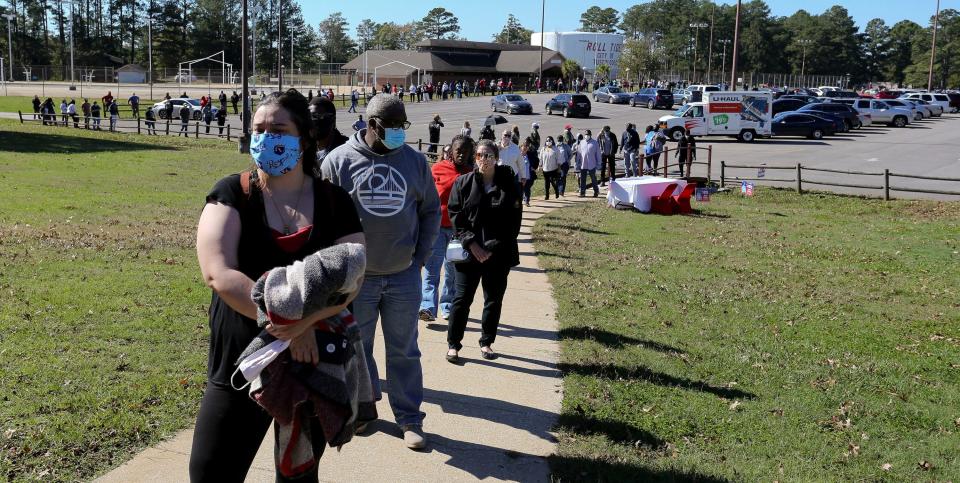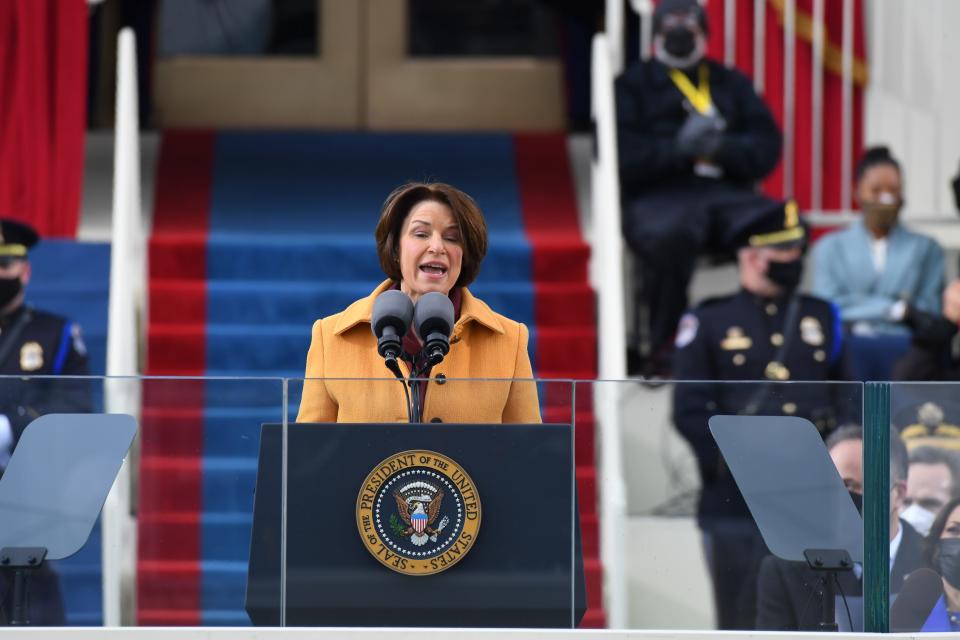‘So what’s next?’: After voting rights loss, Democrats and allies seek alternatives
Vice President Kamala Harris encouraged progressive leaders to keep their chin up a day after Democrats failed to get an expansive voting rights package through the Senate.
Harris, who is leading the White House's suffrage efforts, urged a cadre of civil rights group and social justice organizations to remain united as the Biden administration reconfigures its strategy.
"I want you to know the president and I are undeterred and we are committed to this," she told activists during Wednesday's teleconference, which included groups such as the NAACP, MoveOn and When We All Vote.
"And it is not an extreme statement to say that history will show this was an inflection point," Harris added. "Either it was the beginning of a clear path to deteriorate and weaken our democracy, or this was a moment where we fought for the strength of our democracy, to the benefit of all people in our country." .
In a 50-50 partisan vote, Senate Republicans quashed the For the People Act — an ambitious effort to overhaul U.S. elections — after it failed to advance in the Senate on Tuesday. Democrats fell well short of the 60-vote threshold needed to overcome a filibuster and hold a vote on the bill.
The failure to get a signature measure through Congress is forcing a reset among Democrats, who had heralded the bill as a necessary counter to protect marginalized groups, particularly people of color, from GOP-led state legislatures enacting stricter voting rules.
"So what's next?" Sen. Tim Kaine, D-Va., asked in a tweet after Republicans blocked the bill from coming to a vote. "We have to pass voting rights. I'm going to do everything I can, and we might need to get creative — but we are not accepting failure on this existential issue. The burden is on Democrats' shoulders now, and we're going to move forward and find solutions."
So what's next? We have to pass voting rights. I'm going to do everything I can, and we might need to get creative—but we are not accepting failure on this existential issue. The burden is on Democrats' shoulders now, and we're going to move forward and find solutions.
— Tim Kaine (@timkaine) June 22, 2021
But as progressive activists return to their strategic corners, the Biden administration has provided no clear roadmap as Democrats face a new set of questions about what is the next and best course of action.
Time is also working against the Biden administration and its allies, who are fearful about what is happening at the state level and the shrinking window to get any federal legislation through before the 2022 midterm elections.
"The reason why Senate Republicans are blocking a protection of voting rights now is so they can steal the 2022 election," NAACP President and CEO Derrick Johnson, who was among those on the call with the vice president, told USA TODAY.
Johnson said civil rights organizations on the call expressed a sense of urgency about putting in place protections for communities to cast the ballot, and that Harris mirrored those concerns.
"This is a frontal attack in advance of the 2022 elections to try to control the outcome," he said.
Republicans like Senate Minority Leader Mitch McConnell, slammed the bill as overreaching and an effort by Democrats to steer elections their way.

"The American people can be relieved that the federal government, at least in this area, is not going to expand and supplant the states," McConnell, of Kentucky, said shortly before the vote.
Rahna Epting, executive director of MoveOn, a left-leaning social justice group, said she was encouraged by Harris taking the lead during Wednesday's discussion.
But going forward, Democrats will have to be bolder than in the first five months of the Biden administration, she said.
"We must leave no stone unturned and we must do all things," Epting said. "We need the full force of the White House, and every single member of Congress that is on board with this to be working to figure out where are all the corners of our democracy that we can strengthen to ensure people have the right to vote and that their vote is counted."
Filibuster fight renewed
Those who joined the call with Harris and spoke with USA TODAY said this week's legislative defeat underscores it is past the time to discard the Senate's supermajority rule, which many say is hindering Democrats from moving legislation through the Senate.
"The filibuster must go," Johnson said. "It is being used to impede progress, and a procedural rule that was used by segregationists should not be the same rule used to undermine the protection of the right to vote."
The filibuster is a legislative maneuver used to block legislation from coming to a vote in the Senate.
Currently, 60 senators are needed to stop a filibuster and force a vote, which means a minority group in the Senate can hold up legislation. Undoing the filibuster requires all 50 Democratic senators to force a tie-break by Harris, which is being called for by some lawmakers.
"In case there was any question about the need to eliminate the filibuster: not one of my Republican colleagues even voted to allow DEBATE on the For the People Act," Sen. Amy Klobuchar, D-Minn., said in a tweet after the vote.
The filibuster cannot be used as a tool to suppress the right to vote. There is nothing more fundamental to our democracy than getting this right and protecting equal access to the ballot box.
— Amy Klobuchar (@amyklobuchar) June 22, 2021
But at least two members of the Democratic caucus, Sens. Joe Manchin, of West Virginia, and Kyrsten Sinema, of Arizona, have balked at that idea, saying it is too extreme a step.
"My support for retaining the 60-vote threshold is not based on the importance of any particular policy," Sinema said in a recent op-ed for The Washington Post. "It is based on what is best for our democracy. The filibuster compels moderation and helps protect the country from wild swings between opposing policy poles."
Manchin has cast changing the rule in more apocalyptic terms, saying in previous comments that he isn't "ready to destroy our government."
Both parties have chipped away at the procedural maneuver over the last decade in a way that has alarmed some institutionalist-minded scholars and lawmakers.
Recently, some Democrats have pointed to a series of moves on the political right as justification for nixing the filibuster — from denying the 2020 presidential election results and enacting stricter voting rules in states Biden won to Republicans downplaying the Jan. 6 attack on the Capitol.

"We need to continue to elevate and escalate the pressure on Democrats to get rid of the filibuster, because we're not just talking about an entire agenda that 81 million people voted for in November that will be stymied if we don't do this," Epting said.
"We are talking about existential critical legislation around voting rights and democracy itself."
Harris has previously spoken out against the legislative filibuster when she was running for president last year.
Those on Wednesday's call said the conversation did touch in part on how the Senate's rules should not be allowed to circumvent individual voting rights going forward.
But Harris did not expressly commit to that during her opening remarks of the teleconference and did not explicitly mention the filibuster during the call, according to those who joined.
White House press secretary Jen Psaki did signal this week the administration believed that the Senate vote would "prompt a new conversation" about the filibuster rule, however.
What other options do Dems have?
Outside of blowing up long-held Senate rules, Democrats and their allies are mulling other possibilities to shield voting rights ahead of 2022.
Among them is an alternative bill — the John Lewis Voting Rights Advancement Act — that has yet to make its way through the House.
The measure, renamed for the late Georgia civil rights icon Rep. John Lewis, looks to restore provisions of the 1965 Voting Rights Act that were gutted by the Supreme Court.
Among its goals would be bringing back a pre-clearance formula that would require jurisdictions with a history of voter suppression of minorities to obtain pre-approval from the Justice Department or federal courts before making changes to election processes.
In 2013, the high court struck down that part of the original Voting Rights Act, ruling the formula was outdated. But the case did not rule that the requirement itself was unconstitutional.
The Lewis bill isn't nearly as ambitious as For The People Act, which is a sprawling bill that looked to expand early voting, allow same-day registration, curtail the influence of money in politics and regulate partisan drawing of congressional districts.
House Speaker Nancy Pelosi has said the Lewis proposal won’t be ready until the fall after it goes through a gauntlet of vetting by Democratic aides to ensure it can survive legal challenges.
She has also warned the bill isn't a substitute for the For The People Act.
But some liberal activists say it is still worth pursuing and that Democrats shouldn't take an all or nothing stance.
"We hope Congress will not use the recent vote as a setback, but a set up to passing this piece of important legislation and honoring the legacy of the Honorable John Lewis, and the incredible work he fought for personally and professionally," Terry Ao Minnis, senior director of the census and voting programs for Asian Americans Advancing Justice, told USA TODAY.
She said voting rights groups like hers in the meantime should continue to work with the Justice Department to both "ensure our community's members are well equipped with the information they need to vote and fight on their behalf to ensure their access to the ballot is unencumbered."
SUBSCRIBE: Help support quality journalism like this.
Earlier this month, Attorney General Merrick Garland announced the Cabinet would within the next 30 days fortify its civil rights unit by doubling its staff to target any restrictions to voter access.
One thing progressive leaders agree on is that waiting for next year's midterms to try to increase the Democrats' razor-thin majorities in Congress would be foolish as Trump continues to challenge the 2020 election result and GOP state leaders pass new voting restrictions.
Randi Weingarten, head of the American Federation of Teachers, said the Senate's failure is a wake-up for many liberals on the fence that bipartisanship isn't achievable on this issue.
"It's not that bipartisanship is dead, but what used to be absolutely sacrosanct as a bipartisan issue was the viability of our democracy," she said. "The Republicans have abandoned that due to Trump effect so we have to lean into this issue."
This article originally appeared on USA TODAY: Voting rights bill stalls, so Democrats seek alternatives

 Yahoo Movies
Yahoo Movies 
